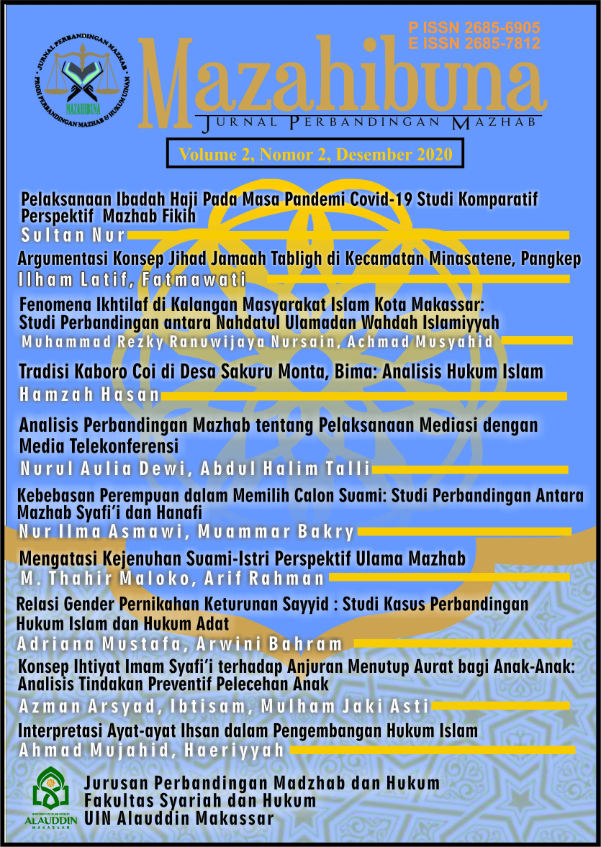Fenomena Ikhtilāf di Kalangan Masyarakat Islam Kota Makassar; Studi Perbandingan antara Nahdlatul Ulama dan Wahdah Islamiyah
Abstract
This article aims to uncover the phenomenon of ikhtilaf among the Islamic community of Makassar city which is devoted to the study of comparison between Nahdlatul Ulama and Wahdah Islamiyah). This type of field research uses a normative approach. The source of this research data is the primary data source namely the leadership of Nahdlatul Ulama and Wahdah Islamiyah Makassar city and secondary data source namely Qur'an, hadith, fiqh, books, journals, and literature related to the discussion of this article. The results of this study suggest that Nahdlatul Ulama and Wahdah Islamiyah Makassar city in applying the law using the legal resources agreed by jumhur Ulama, namely: Qur'an, As-Sunnah, ijma, and qiyas. Nahdlatul Ulama and Wahdah Islamiyah also use legal sources that are not agreed by jumhur Ulama such as istishan, mashlahah al-mursalah, and others but prefer the source of the law that has been agreed by jumhur Ulama. Nahdlatul Ulama and Wahdah Islamiyah Makassar city differ in terms of commemorating the maulid of the Prophet Muhammad. In this case, Nahdlatul Ulama commemorates the anniversary of maulid while Wahdah Islamiyah does not commemorate it. Nahdlatul Ulama and Wahdah Islamiyah Makassar city considers that the phenomenon of ikhtilaf will not be solved, but what can be solved is our way of addressing the ikhtilaf, and the attitude is mutual tolerance, mutual respect, mutual respect, and mutual support. The implication of this article is expected to be expected to the Islamic community when looking at the phenomenon of ikhtilaf, especially in terms of furu', should not be to concern each other. When the phenomenon of ikhtilaf happens the best thing to do is tolerate each other, respect each other, respect each other, and support each other
References
Ali, Mukhti. Agama dalam Pembentukan Kepribadian Nasional. Yogyakarta: Yayasan An-Nida’, 1969.
al-Madini, Malik bin Anas bin Malik bin ‘Amir al-Ashbah. Muwattha Imam Malik, Juz V, Cet. I; Muassasa al-Risalah: 1425 H.
Bakry, Muammar M. Etika dan Praktik Bermazhab. Cet I; Makassar: Alauddin University Press, 2013.
Basyir, Akhmad Azhar. Negara dan Pemerintahan dalam Islam. Yogyakarta: UII Press, 2000.
Daradjat, Zakiyah. Ilmu Jiwa Agama. Jakarta: Bulan Bintang, 2005.
Eda, Maulana La. https://wahdah.or.id/acara-peringatan-maulid-nabi-antara-ungkapan-cinta-dan-logika-sunnah-bagian-1/ (12 September 2020).
Gunawan, Adi. Kamus Praktis Ilmiah Populer. Surabaya: Kartika, t.th.
Hasan, M. Ali. Perbandingan Mazhab. Cet II; Jakarta: PT RajaGrafindo Persada, 1996.
https://wahdah.or.id/metodologi-ijtihad-dan-fatwa-dewan-syariah-wahdah-islamiyah/ (18 September 2020).
Kementrian Agama Republik Indonesia. Ar-Rahim Al-Qur’an dan Terjemahan. Bandung: CV Mikraj Khazanah Ilmu, 2013.
Minhajuddin, H. Ikhtilaf Ulama Suni dan Pengaruhya tehadap Perkembangan Fikih Islam. Cet I; Gowa: Alauddin University Press, 2012.
Muhammad, Syekh Yusuf Khathar. al-Mausu’ah al-Yusufiyyah. juz. 1, https://islam.nu.or.id/post/read/84116/penjelasan-para-ulama-tentang-maulid-nabi-muhammad (6 September 2020).
Naro, Wahyuddin, Abdul Syatar, Muhammad Majdy Amiruddin, Islamul Haq, Achmad Abubakar, and Chaerul Risal. “Shariah Assessment Toward the Prosecution of Cybercrime in Indonesia.” International Journal of Criminology and Sociology 9 (2020): 572–586. https://doi.org/10.6000/1929-4409.2020.09.5
Sanusi, Nur Taufiq. Sekretaris Pengurus Wilayah Nahdlatul Ulama Sulsel. Wawancara, Makassar, 1 September 2020.
Syatar, Abdul, and Achmad Abubakar. Filosofi ’Uqubah Islamiyah Versi Ramadhan Al-Buti; Relevansi Dengan Pemidanaan Dalam Sistem Hukum Indonesia. Gowa: Alauddin University Press, 2020.
Yunta, Akhmad Hanafi Dain. Wakil Ketua Dewan Syariah Wahdah Islamiyah Makassar. Wawancara. Makassar, 10 September 2020.

This work is licensed under a Creative Commons Attribution 4.0 International License.
Authors who publish with Mazahibuna: Jurnal Perbandingan Mazhab agree to the following terms:
- Authors retain copyright and grant the Mazahibuna: Jurnal Perbandingan Mazhab right of first publication with the work simultaneously licensed under Creative Commons Attribution License (CC BY 4.0) that allows others to share the work with an acknowledgment of the work's authorship and initial publication in this journal.
- Authors can enter into separate, additional contractual arrangements for the non-exclusive distribution of the published version of the work (e.g., post it to an institutional repository or edit it in a book), with an acknowledgment of its initial publication in this journal.
- Authors are permitted and encouraged to post their work online (e.g., in institutional repositories or on their website) before and during the submission process, as it can lead to productive exchanges, as well as earlier and greater citation of published work.

